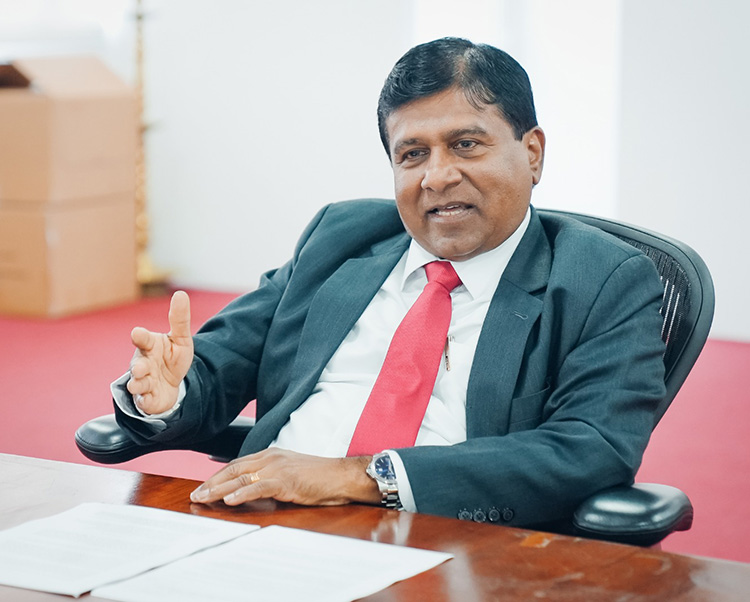NEWS
SL Anti-Terrorism Bill less draconian than one in Britain

Dr Rajapakshe
– Justice Minister Rajapakshe
By Saman Indrajith
Justice Minister Dr Wijeyadasa Rajapakshe yesterday told Parliament that the provisions contained in the Anti-Terrorism Bill, presented to the House, were less severe and harsh than those in the counter terrorism laws in Great Britain.
Dr. Rajapakshe said so responding to a question raised by SLMC leader Rauff Hakeem, who asked the Minister to explain the changes the new Bill envisaging to be introduced to the Prevention of Terrorism Act.
Earlier in the day, the Minister presented the Bill to the House and Secretary General of Parliament Kushani Rohanadeera read out the Bill’s preamble: “Anti-Terrorism,— Bill to make provision for the protection of the National Security of Sri Lanka and the people of Sri Lanka from acts of terrorism, other offences associated with terrorism and certain specified acts constituting the offence of terrorism committed within or outside Sri Lanka; for the prevention of the use of Sri Lankan territory and its people for the preparation for terrorism outside Sri Lanka; to provide for the detection, identification, apprehension, arrest, detention, investigation, prosecution and punishment of any person who has committed an act of terrorism or any other offence associated with terrorism; for the repeal of the Prevention of Terrorism (Temporary Provisions) Act, No. 48 of 1979; and for matters connected therewith or incidental thereto.”
Responding to MP Hakeem, Minister Dr. Rajapakshe said: “The Prevention of Terrorism Act had many criticisms against it. In 2015, we started the process of bringing a new law under the name of Counter Terrorism Act. It was presented to Parliament and then challenged before the Supreme Court and the Supreme Court has issued its determination on the Counter Terrorism Bill.”
However, the then government had not been able to proceed with the Bill and following the Easter Sunday terror attacks, the proces had come to a halt. “In 2022, we resumed the process. We decided to bring about a new Act on the matter. We formulated a new Act, and it took one and half years because we allowed all stakeholders to express their views on this. We met with all Ambassadors and High Commissioners in this country and explained to them the content of this legislation. They also approved it.
“Thereafter we gazetted it and hoped to take it up in Parliament in November, but there were concerns that if we presented the Bill in the House, it would hinder the chances for people to go before the court against it because court vacation was to commence soon. There were requests from many parties to postpone it. As such, we delayed the process. Briefly I can explain some of the changes that we introduced. A court can convict a person on the basis of a confession. It is not recognized under the normal law of evidence. Yet it was possible under the special laws of the PTA.
It was the biggest criticism against the PTA. We have removed that and now it goes as per the normal law of evidence. The second issue of contention was that as per the existing law, the Defence Minister has the powers to issue detention orders. The Defence Minister can give a detention order for three months and he can also extend it.
There was a proposal that powers should be given to the DIGs. We now plan to give those powers to the Defence Secretary. As per the law to be introduced, the Defence Secretary can give a detention order for one month and if there is a need to extend that, then prior approval of a magistrate is needed. So, we brought the detention under the courts’ powers. In addition, the Human Rights Commission would be given powers to visit and inspect those under detention.
“We did not have a definition for the term terrorism. Though there is an internationally accepted definition for the term corruption there is no such definition for the term terrorism. Each country has defined it as per their needs and requirements. We have brought about a definition for the term terrorism which is quite similar to the definition in the Counter Terrorism Act in Great Britain. However, our definition is not as severe as the one in Great Britain.”
